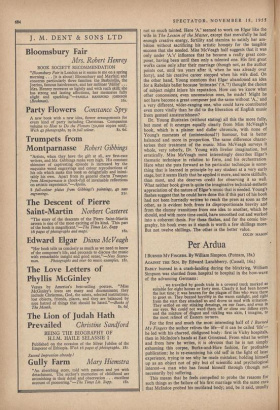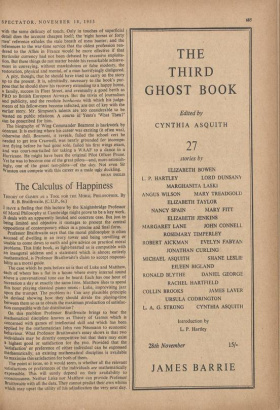Per Ardua
BADLY burned in a crash-landing during the blitzkrieg, William Simpson was shuttled from hospital to hospital in the bow-wave of the advancing Germans :
. . . we travelled by goods train in a covered truck marked as suitable for eight horses or forty men. Clearly it had been horses the last time; it was heaven for the plague of flies who were there to greet us. They buzzed horribly in the warm sunlight, and right from the start they attacked us and drove us mad with irritation. They settled on our stinking dressings, on our faces, and even in our eyes. We could not ward them off or close our lidless eyes, and the mixture of disgust and tickling was akin, I imagine, to the most refined of Eastern tortures.
For the first and much the most interesting half of I Burned My Fingers the author relives the life—if it can be called 'life'—
he led with his charred, disfigured body : first in Vichy hospitals, then in McIndoe's hands at East Grinstead. From what he writes and from how he writes, it is obvious that he is not simply exhuming this corpse, Burke-and-Hare fashion, for profitable publication; he is re-examining his old self in the light of later experience, trying to see why he made mistakes; holding himself up as an object not of pity but of scientific and psychological interest—a man who has found himself through (though not necessarily by) suffering.
This means that he feels compelled to probe the reasons for such things as the failure of his first marriage with the same care that Mclndoe probed his mutilated body; and, be it said, usually With the same delicacy of touch. Only in touches of superficial detail does the account cheapen itself; the 'eight horses or forty men' reference exhales the stale breath of mess banter; and the references to the war-time service that the oldest profession ren- dered to the Allies in France would be more effective if that particular currency had not been debased by excessive exploita- tion. But these things do not matter beside his remarkable achieve- ment in conveying, without mawkishness or false modesty, the restoration, physical and mental, of a man horrifyingly disfigured.
A pity, though, that he should have tried to carry on the story lip to the present. It is, admittedly, necessary to the book's pur- pose that he should show his recovery extending to a happy home, a family, success in Fleet Street, and eventually a good berth as PRO to British European Airways. But the trivia of journalism and publicity, and the resolute bonhomie with which his judge- ments of his fellow-men become infected, are out of key with the earlier story. Mr. Simpson's talents are too considerable to be Wasted on public relations. A course in Yeats's 'What Then?' can be prescribed for him.
The biography of Wing Commander Beamont is hackwork by contrast. It is exciting where his career was exciting (it often was), Otherwise dull. Beamont, it reveals, failed the school cert he needed to get into Cranwell, was nearly grounded for incompe- tent flying before he had gone solo, failed his first wings exam, and was court-martialled for taking a WAAF to a dance in a Hurricane. He might have been the original Pilot Officer Prune. Yet he was to become one of the great pilots—and, more astonish- ingly, one of the great test-pilots—of the day. Not even Sir Winston can compete with this career as a male ugly duckling.
BRIAN INGLIS











































































 Previous page
Previous page